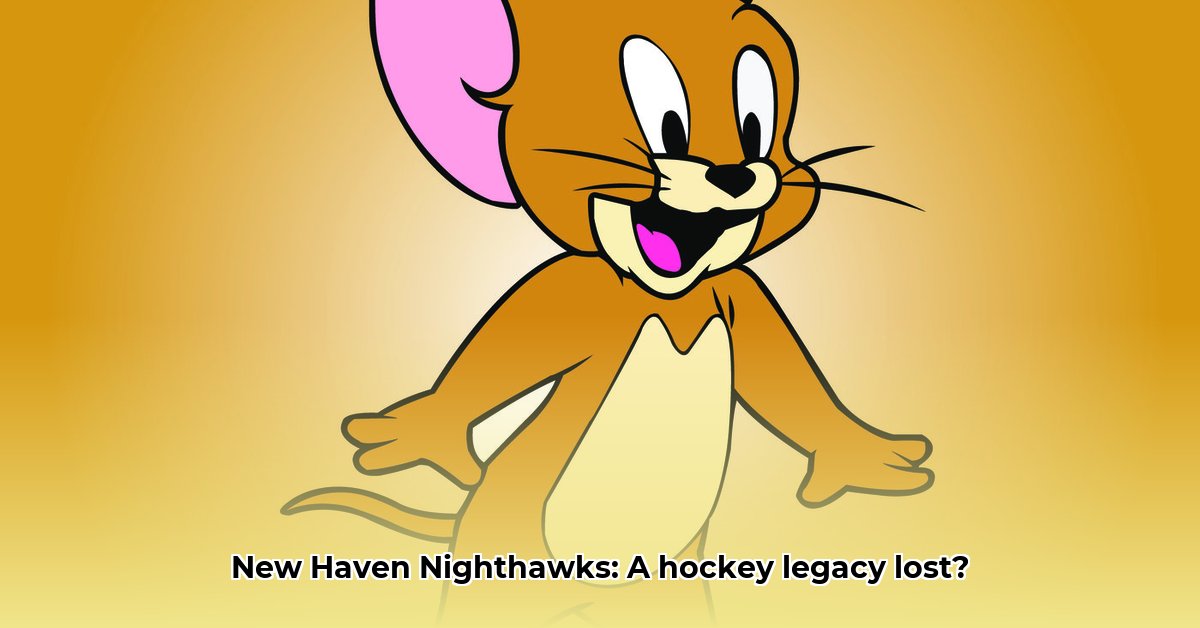The story of the New Haven Nighthawks is more than just a recounting of games won and lost; it’s a compelling narrative of a minor league hockey team deeply interwoven with the identity of its city. Their journey, marked by both exhilarating highs and disheartening lows, provides insights into the unique challenges faced by professional sports teams and the indispensable role of community support in their survival. Beyond mere statistics, the Nighthawks’ story serves as a poignant reminder of the complexities inherent in minor league sports. Let’s delve into the history of this team to understand the factors that contributed to their ultimate demise.
The New Haven Nighthawks: A Legacy Forged in Ice
The New Haven Nighthawks were more than just a hockey team; they represented the spirit of New Haven. Their story, filled with both triumphs and setbacks, showcases community dedication, financial hardships, and the realities of minor league sports.
A Meteoric Rise and Initial Challenges
In 1972, the newly constructed New Haven Coliseum was filled with excitement. Over 8,114 fans attended the Nighthawks’ inaugural exhibition game against their NHL parent club, the Minnesota North Stars, marking the largest crowd to ever watch a Nighthawks game at the Coliseum. The team quickly captured the hearts of local fans, sparking a period often considered the golden age of minor league hockey in New Haven. Playoff runs and Calder Cup Finals appearances followed, solidifying their status as a source of pride for New Haven. However, this initial success concealed underlying vulnerabilities that would later jeopardize their future.
The Rollercoaster of NHL Affiliations and Resulting Instability
The Nighthawks’ affiliations with various NHL teams—including the Minnesota North Stars, New York Islanders, New York Rangers, Los Angeles Kings, and Ottawa Senators—proved to be a double-edged sword. While each affiliation brought new talent and fleeting moments of triumph, it also caused consistent instability. Frequent changes in their “parent club” strained fan loyalty and created challenges in securing consistent funding. A stable, long-term partnership was critical, yet eluded the Nighthawks, highlighting the vital role stable partnerships play for small clubs and demonstrating how changes in NHL strategy can impact the entire organization.
Cracks in the Coliseum: Physical and Financial Decay
The Veterans Memorial Coliseum, the Nighthawks’ home, mirrored the team’s struggles as the years passed. Its aging infrastructure, including rusting parking garages and crumbling concrete, symbolized deeper issues: a lack of investment in the team and the city itself. In 1980, a piece of concrete fell from the garage atop the Coliseum, striking Executive Director Anthony Tavares. The decline in the Coliseum’s condition raised concerns about fan safety and created an unfavorable environment for attracting fans and sponsors.
The Desperate Plea to “Save the Team!” and Jerry McSorley’s Efforts
By 1987, the Los Angeles Kings issued an ultimatum: sell 1,300 season tickets for the upcoming season or lose the team. Jerry McSorley, along with Joel Schiavone, spearheaded a “Save the Team” campaign, demonstrating the city’s deep affection for its hockey team. Schiavone even camped out for a week on the Coliseum roof in a plywood shack to raise awareness. While this effort provided temporary relief, and bought the Nighthawks another five seasons in New Haven, it couldn’t resolve the underlying long-term financial problems. Consistent, sustainable funding proved unattainable, exposing the financial vulnerabilities of many minor league teams. It’s a reminder that passion is not enough to survive, as a more sustainable business model was needed.
The Final Seasons and Eventual Relocation
In 1989, despite a 4th place regular season finish, the Nighthawks made it to the Calder Cup finals, but ultimately fell short. In 1992, the Ottawa Senators became the new parent club, compelling the team to re-brand as the New Haven Senators. This marked the end of the beloved Nighthawks, and fan interest plummeted. The franchise eventually relocated to Prince Edward Island, Canada, in 1993.
A Legacy Etched in Ice and Lessons Learned
The Nighthawks’ legacy extends beyond wins and losses. Their initial success showcased the power of community support, while their demise highlighted the necessity of long-term planning and financial stability. Jerry McSorley’s “Save the Team” campaign stands as a poignant reminder of the dedication of those who cherished the Nighthawks. Their story continues to spark discussions about the challenges and triumphs of minor league hockey, solidifying the local hockey presence. The Coliseum itself was eventually demolished in 2007, marking the end of an era for hockey in New Haven.
How to Avoid Minor League Hockey Team Financial Failure: Lessons from the New Haven Nighthawks
The New Haven Nighthawks provide key takeaways from their story:
- High operational costs, limited revenue streams, and intense competition pose significant obstacles.
- Diversifying revenue beyond ticket sales is crucial for financial health.
- Strong community engagement, while vital, requires strategic investment.
The Nighthawks’ Ascent and Demise: A Financial Case Study
The New Haven Nighthawks, as a minor league hockey team, illustrate the compelling narrative of success, struggle, and ultimate failure. Their journey provides lessons on how to avoid minor league hockey team financial failure. The team’s initial success was fueled by local support and performance. What challenges emerged, and could the Nighthawks have changed course?
The High Cost of the Game in Minor League Hockey
Minor league hockey often lacks the lucrative TV deals and sponsorships of the NHL, resulting in high operational costs. Player salaries, travel expenses, equipment costs, and arena rentals all consumed significant resources for the Nighthawks. The absence of substantial broadcast revenue streams forces teams to rely heavily on gate receipts and local sponsorships. So how can teams overcome these hurdles and manage costs effectively?
Diversifying Revenue: Beyond the Box Office Sales
Relying solely on ticket sales is rarely sufficient. The Nighthawks’ story highlights the need for diversification, including merchandise sales, concessions revenue, sponsorships from local and regional businesses, and hosting non-hockey events at the arena such as concerts or esports tournaments. Could a more aggressive marketing strategy and diversification helped save the team? The New Haven Nighthawks relied heavily on a single revenue stream, which proved to be problematic for them.
Community Engagement: A Vital Component Needing Strategic Investment
Cultivating a strong connection with the community is vital for fan loyalty and attracting sponsors. However, building this rapport requires investment in outreach programs. While initial success was tied to community ties, failing to adapt this engagement contributed to their downfall. Can community bonds be maintained even when financial stability is in decline?
The Importance of Affiliation and the Need for Long-Term Planning
The Nighthawks’ situation demonstrates the vulnerability teams face when relying on NHL team affiliations. The impact can be devastating when these affiliations end. Teams must develop sustainable business models, rather than relying on partnerships. How can teams prevent dramatic financial collapses through diversification and long-term planning?
Steps Toward Financial Stability for Minor League Teams
To achieve financial success and long-term sustainability, teams should focus on the following:
- Robust Budgeting and Financial Planning: Develop detailed budgets and monitor expenses meticulously.
- Aggressive Revenue Diversification: Explore all possible revenue avenues beyond ticket sales, including merchandise, concessions, sponsorships, and arena events.
- Strategic Community Engagement: Invest in community outreach, adapting strategies to maintain fan loyalty and attract new fans.
- Building Strong Relationships: Develop robust partnerships with sponsors and local businesses.
- Data-Driven Decision Making: Utilize data analytics to understand fan behavior and optimize marketing efforts.
By utilizing data to increase revenue generation, one can have a higher chance of increasing revenue and ensure the team’s survival.
Factors Affecting Minor League Hockey Team Sustainability in New Haven
The New Haven Nighthawks’ story isn’t isolated, as many minor league hockey teams face similar struggles. Here’s a quick summary of the elements that influence financial viability of teams like the Nighthawks:
- Financial instability is a major hurdle to overcome.
- Strong Fan Support is essential for long-term survival.
- Effective Management and Operations are key components.
So what were the Factors Affecting Minor League Hockey Team Sustainability in New Haven?
The Ice Melts: Financial Fragility and Economic Factors
Minor league hockey operates on thin ice. The Nighthawks relied on ticket sales, sponsorships, and concessions which can be quickly eroded by economic downturns. What were the local economic conditions during the Nighthawks’ existence and how did they affect attendance and sponsorship revenue? What were the local interests, ticket prices, and operational costs for the team?
A Community’s Cold Shoulder? The Importance of Fan Engagement and Brand Identity
Strong community ties are essential for survival. The Nighthawks needed to foster local ownership and pride. Did they engage with the New Haven community effectively through family-friendly events and partnerships with local businesses? How did the team’s brand resonate with the local population, and what steps were taken to cultivate a loyal fanbase?
The Game Plan: Operational Efficiency and Strategic Partnerships
Teams must be extremely efficient when operating on tight budgets. It entails careful cost management, effective marketing, and strategic partnerships. Could they have found more cost-effective










